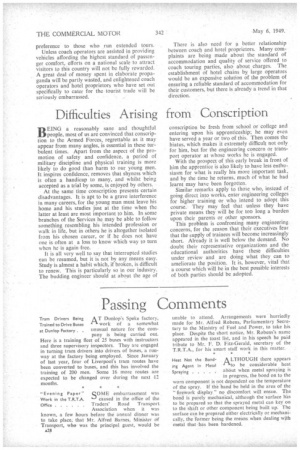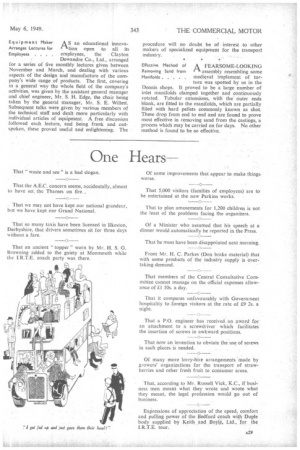Passing Comments
Page 2

Page 3

If you've noticed an error in this article please click here to report it so we can fix it.
Tram Drivers Being A T Dunlop's Speke factory, Trained to Drive Buses " work of a somewhat unusual nature for the company is being carried out. Here is a training fleet of 25 buses with instructors and three supervisory inspectors. They are engaged in turning tram drivers into drivers of buses, a runway at the factory being employed. Since January of last year, four of Liverpool's tram routes have been converted to buses, and this has involved the training of 200 men. Some 16 more routes are expected to be changed over during the next 12
months. at Dunlop Factory. .
"Evening Paper" QPME embarrassment was Work in the T.R,T.A caused in the office of the
Office Traders' Road Transport.
Association when it was known, a few hours before the annual dinner was to take place, that Mr. Alfred Barnes, Minister of Transport, who was the principal guest, would be
A218 unable to attend. Arrangements were hurriedly made for Mr. Alfred Robens, Parliamentary Secretary to the Ministry of Fuel and Power, to take his place. Despite the short notice, Mr. Robens's name appeared in the toast list, and in his speech he paid tribute to Mr. F. D. Fitz-Gerald, secretary of the T.R.T.A., for his smart staff work in this matter.
Heat Not the BondA LTHOUGH there appears
ing Agent in Metal to be considerable heat
Spraying about when metal spraying is
in progress, the bond on to the worn component is not dependent on the temperature of the spray. If the hand be held in the area of the " firework display " no discomfort will ensue. The bond is purely mechanical, although the surface has to be prepared so that the sprayed metal can key on to the shaft or other component being built up. The surface can be prepared either electrically or mechanically, the former being the means when dealing with metal that -has been hardened. Equipment Maker Arranges Lectures for Employees „ „
A S-an educational innova
"tion open to all its employees, the Clayton Dewandre Co., Ltd., arranged for a series of five monthly lectures given between November and March, and dealing with various aspects of the design and manufacture of the company's wide range of products. The first, covering in a general way the whole field of the company's activities, was given by the assistant general manager and chief engineer, Mr. S. H. Edge, the chair being taken by the general manager, Mr. S. E. Willett. Subsequent talks were given by various members of the technical staff and dealt more particularly with individual articles of equipment. A free discussion followed each lecture, and being frank and outspoken, these proved useful and enlightening. The procedure will no doubt be of interest to other makers of specialized equipment for the transport industry.
Effective Method of A FEARSOME-LOOKING Removing Sand from "assembly resembling some Manifolds medieval implement of tor
ture was spotted by us in the Dennis shops. It proved to be a large numher of inlet manifolds clamped together and continuously rotated. Tubular extensions, with the' outer ends blank, are fitted to the manifolds, which are partially filled with hard pellets commonly known as shot. These drop from end to end and are found to prove most effective in removing sand from the castings, a process which may be carried on for days. No other method is found to be so effective,




























